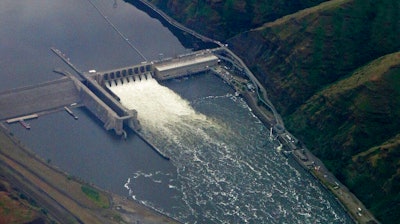
SPOKANE, Wash. (AP) — Nearly two decades ago, Republican President George W. Bush stood on a bank of the Snake River near Pasco, Washington, and declared that four hydroelectric dams would not be torn down on his watch, though many blamed them for killing endangered salmon.
This month, Republican U.S. Rep. Mike Simpson of Idaho issued a bold plan that called for removing those same dams to save the salmon. In between those two acts were decades of litigation that show no sign of ending and $17 billion worth of improvements to the dams that did little to help fish.
Now the question is: Can Simpson's plan win approval from Congress and the Biden administration and help save an iconic Pacific Northwest species from extinction?
Other Republicans are vowing to save the dams. Democrats have come out in support of Simpson's plan, which calls for spending $33 billion to breach four dams, replace the lost hydroelectric energy with other sources and ensure that irrigation, river navigation and flood control will continue as before.
The issue of what to do with the Snake River dams has long divided the Pacific Northwest, with Democrats generally siding with saving the salmon and Republicans saying it's foolish to remove hydropower resources in the era of climate change.
But Lindsay Slater, Simpson's chief of staff, said the political winds are blowing in favor of a solution to this decadeslong controversy.
For one thing, the Biden administration is preparing a massive economic relief package for the nation, and Simpson wants the Northwest to designate this solution to the salmon issues for the region's share of the package, Slater said. For another, Democratic control of the Senate has propelled numerous longtime senators from the Northwest into committee leadership positions for the first time in years, he said.
“There is all this seniority in the Northwest,” Slater said, pointing to Washington Sens. Patty Murray and Maria Cantwell and Oregon Sen. Ron Wyden.
“This is lightning in a bottle. It really is,” Slater said. “We are telling stakeholders this is a once-in-30-years opportunity. Do we want to grab it?”
Simpson was motivated by the prospect of continued litigation even as salmon die off, Slater said.
Simpson unveiled the plan in a video posted to his website Saturday, saying, “The current system is clearly not working.”
Four Republican House members — Cathy McMorris Rodgers, Dan Newhouse and Jaime Herrera Beutler, all from Washington, and Rep. Russ Fulcher of Idaho — opposed Simpson's plan.
“The hydropower developed in the Pacific Northwest benefits every resident, family, and business in our region," they said in a joint statement. "Without it, life as we know it in our region would cease to exist.”
McMorris Rodgers, whose district has several of the dams, has long fought to preserve the structures.
“Spending more than $33 billion to breach them — with no guarantee that doing so will restore salmon populations — is a drastic, fiscally irresponsible leap to take,” she said.
Conservation and tribal groups issued statements supporting Simpson's proposal.
“We’ve spent decades making minor improvements and adjustments that simply haven’t worked, and what we really need is serious funding and a major overhaul,” said Liz Hamilton, executive director of the Northwest Sportfishing Industry Association.
“Healthy populations of wild salmon and steelhead are essential for Northwest tribes, local economies and the region’s way of life — and they’re running out of time,” said Collin O’Mara, president and CEO of the National Wildlife Federation.
The plan calls for the removal of the Lower Granite Dam near Colfax in 2030, with removal of three other dams — Ice Harbor, Little Goose and Lower Monumental — in 2031. The dams were built in the 1950s and 1960s to provide power, flood control, irrigation and to make navigable a portion of the Snake River from Lewiston, Idaho, to the Tri-Cities of Richland, Kennewick and Pasco in Washington, and downriver to Pacific Ocean ports.
Simpson's proposal includes removing the earthen berms adjacent to all four Lower Snake River hydroelectric dams to let the river run free, while spending billions to replace the benefits of the dams for agriculture, energy and transportation.
Glen Squires, head of the Washington Grain Commission, said Simpson should look to his own backyard if he wants to help fish.
“If the representative is so interested in dams and getting fish back to Idaho, I’d suggest he look at those within his state that were built without fish passage, cutting fish off from pristine habitat,” Squires said.
Nez Perce tribal Chairman Shannon Wheeler, whose ancestors kept Lewis and Clark alive with salmon from Idaho’s rivers when the starving explorers stumbled into Nez Perce territory in 1805, said the tribe strongly supports Simpson’s plan.
“We view restoring the lower Snake River, a living being to us, and one that is injured, as urgent and overdue," Wheeler said.
Simpson is not the only one seeking a comprehensive solution to helping conserve the salmon population while providing for the region's power needs. The governors of Washington, Oregon, Idaho and Montana have formed the Columbia Basin Collaborative, which must be involved in any solution, Washington Gov. Jay Inslee said Tuesday.
“Washington welcomes Rep. Simpson’s willingness to think boldly about how to recover Columbia and Snake River salmon in a way that works for the entire region," Inslee said.






















